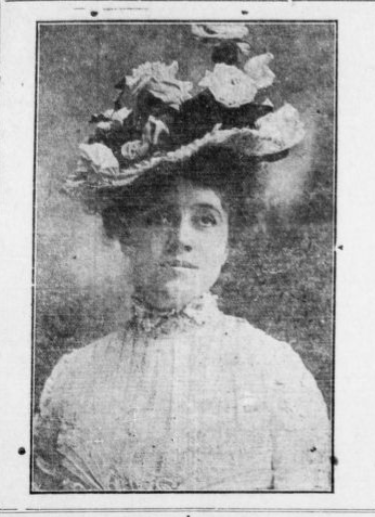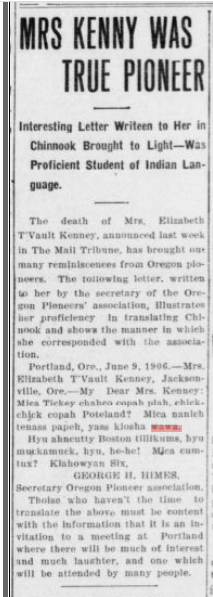1911 letter: Mrs. Kenny Was True Pioneer
A not-so-tiptop typesetter gives us mildly muddled, but still interesting, Chinook Jargon and English from post-frontier southwest Oregon.
I’ll discuss the Jargon part after showing you the full article that it comes in:


MRS KENNY WAS
TRUE PIONEERInteresting Letter Writeen [sic] to Her in
Chinnook [sic] Brought to Light — Was
Proficient Student of Indian Lan-
guage.The death of Mrs. Elizabeth
T’Vault Kenney, announced last week
in The Mail Tribune, has brought out
many reminiscences from Oregon pio-
neers. The followlng letter, written
to her by the secretary of the Ore-
gon Pioneers’ association, illustrates
her proficiency in translating Chi-
nook and shows the manner in which
she corresponded with the associa-
tion.Portland, Ore., June 9, 1906. — Mrs.
Ellzabeth T’Vault Kenney, Jackson-
ville, Ore. — My Dear Mrs. Kenney:
Mica Tickey chahco copah piah, [sic] chick-
chick copah Poteland? Mica nanich
tenass papeh, yass [sic] klosha [sic] wawa.Hyu ahncutty Boston tillikums, hyu
muckamuck, hyu, [sic] he-he! Mica cum-
tux? Klahowyan [sic] Six,
GEORGE H. HIMES,
Secretary Oregon Pioneer association.Thoise [sic] who haven’t the time to
translate the above must be content
with the information that it is an in-
vitation to a meeting at Portland
where there will be much of interest
and much laughter, and one which
will be attended by many people.
— from the Medford (OR) Mail Tribune of October 24, 1911, page 6, column 2
Now about that Chinuk Wawa section:
Mica Tickey [1] chahco copah piah, [sic] chick-
mayka tíki cháku kʰupa páya-t’síkt’sik
you want come by fire-wagon
‘Would you like to come by train’
chick [2] copah Poteland? [3] Mica nanich
kʰupa pʰótłən? mayka nánich
to Portland? you see
‘to Portland? You can see’
tenass papeh, [4] yass [sic] klosha [sic] wawa. [5]
tə́nəs pípa, hayas-łúsh wáwa.
little paper, very-good words.
‘the little paper, (and) the nice words.’
Hyu ahncutty Boston [6] tillikums, [7] hyu
háyú ánqati bástən-tílikam-s, háyú
many oldtime American-person-s, much
‘(There will be) lots of oldtime White people, lots of’
muckamuck, hyu, [sic] he-he! [8] Mica cum-
mə́kʰmək, háyú híhi! mayka kə́mtəks?
food, much fun! you understand?
‘food, lots of fun! Do you understand?’
tux? [9] Klahowyan [sic] [10] Six,
łax̣áwyam síks.
goodbye friend.
‘Goodbye friend.’
Notes:
Mica Tickey [1] surely reflects Settler conventions of polite invitation: ‘would you like to…’ isn’t so often seen or heard in Jargon when what’s effectively meant is a mild imperative.
piah, [sic] chick-chick [2] for ‘train’ is genuine southern-dialect / older Chinuk Wawa; one way that we know this for sure is that it shows up as a loan into Upper Chehalis Salish!
Poteland [3] also is the real deal; this oldtime pronunciation is documented in the 2012 Grand Ronde CW dictionary.
papeh, [4] here, I suspect is being used in a very Settler way, as if it meant the same thing as its etymological English source ‘paper’ — whereas in CW this word strongly tends to denote ‘writing’.
yass [sic] klosha [sic] wawa. [5] Here is an intersection of very good early-creolized CW grammar (expressing ‘very good’) with another typically Settler way of talking (using klosh[e] wawa as a noun for a ‘good conversation; a fine chat’).
Boston [6] — Need anyone have pointed out that the only folks normally invited to Oregon pioneer reunions were non-Indigenous?
tillikums [7] is a morphological Settler-ism, putting the English noun plural -s onto the Jargon word for ‘person; people’.
he-he [8] is another semantic Settler-ism; they loved to use this CW word as ‘fun’ (which was always a noun at the time, in English), whereas most other fluent Jargon speakers understood it to mean focally ‘laugh’.
Mica cum-tux? [9] It was tellingly typical for Settlers to end anything they said in Jargon with ‘Do you understand?’
Klahowyan [sic] [10] — I just want to call attention to the pronunciation that Himes may be using here, with the “M” at the end of this word; this would correlate with real frontier-era experience speaking Chinuk Wawa. The “Klahowya” variant became more common only later on, and primarily among Settlers. (And here it’s possible we’re seeing a typesetter misreading a spelling variant of it, < klahowyah >, from a handwritten draft.)
Summary:
The invitation note is solid Chinuk Wawa, at the same time as it’s very identifiable as Settler talk.

So interesting to see the word klahowya, which my Haida and [mostly] Tsimshian relatives used only to say hello [not goodbye]
.
LikeLiked by 1 person
That is interesting! Funny, around Kamloops we have this same word only being used for ‘goodbye’ in the letters written by Indigenous people…
LikeLike
Oh, a bit of mystery there. There was a Haida saying that translated broadly as ‘Don’t say goodby; just say I’ll see you again i.e., bad phonetics, ising dang hl qing sung (I took haida so long ago, I’d have to look it up. [sounds like i-sing dung iihl king sung]
LikeLike